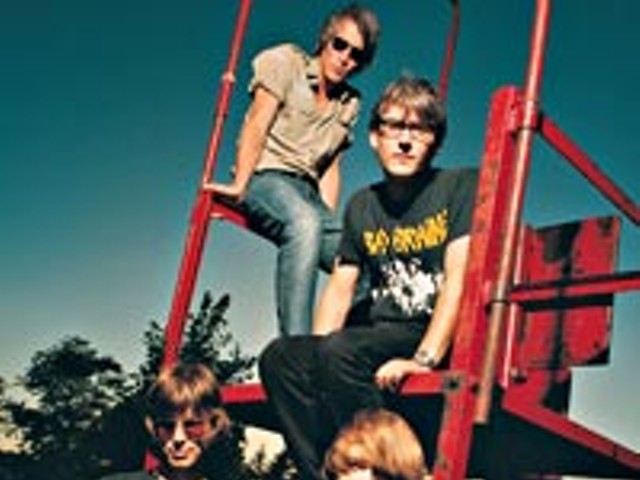A karaoke bar in an Oak Park strip mall is a far cry from the whole post-industrial-wasteland image Detroit techno’s somber, soulful austerity usually conjures. So Thursday night’s pre-DEMF party at the Royal Kubo is a nice change for techno visitors expecting some underground party in a dimly lit urban bunker, reminding us all that before techno was important, it was fun.
Dykehouse, a karaoke DJ who looks like a way-too-old Hanson member and a way-too-young mall record-store clerk, gestures wildly over incomprehensible tunes, as Detroit’s techno elite — at least the ones who will venture to Oak Park — mingle.
A big conversation starter here is the “Say Nice Things About Detroit” T-shirts Royal Kubo owner John Santos has printed up. The shirts are a throwback to the ones Emily Gail used to sell in her downtown store, a sort of not-as-big-a-hit version of the “I-Heart-New York” shirts. Gail used the phrase to steer Detroit’s image away from murder rates and white flight in the late ’70s; Santos wants us all to get over DEMF 3’s Wagnerian symphony of clashing egos and uneven business practices.
The DEMF has been a lot about pride and props in years past, giving long-overdue pats on the back and recognition to Detroit musicians who have been surviving and thriving without it for a decade. The Royal Kubo party is no exception, and on this pre-DEMF Thursday night, we see the return of Rotator.
Rotator was the longtime DJ at a rowdy east-side club called the Dancery — a club known as much for its shootings as for its music. Most recently, the Italian Rotator was scratch DJ for Ann Arbor’s Ectomorph before health issues got the best of him and he’s had to pawn his deep, deep record collection. But this night, Rotator is back — not as flashy, but playing the Dancery-back-in-the-day favorites to the handful who really appreciate and understand the comeback.
Friday, DEMF 3 is still a day away, but that doesn’t stop a massive, free outdoor party from descending on the Belle Isle band shell. Trouble is, it’s also the Detroit Public Schools’ Senior Skip Day. Access to the park is severely restricted, so the party never quite swells into the free-for-all its lineup promises.
Still, outspoken technocrat Alan Oldham makes his point, opening his pre-DEMF set with Mary J. Blige’s “No More Drama.” As one of the relatively lesser-known latter-wave Detroit techno artists, Oldham has never been well received by the techno old(er)-guard clique that shaped the first two festivals. It’s ironic because Oldham’s brand of fiery, hard minimal techno is arguably more resonant with young electronic-music fans than the jazzier, Euro-techno favored the last two years. And it shows in the large number of young, mad-for-it party kids that will show up for Oldham and fellow techno purists The Advent come Sunday.
Record labels completely shut out of the DEMF roster take matters into their own hands and throw their own parties. Friday night, Ann Arbor’s Ghostly International takes over Alvin’s, offering the kind of post-techno flavor critics of this year’s DEMF miss, including IDM-cum-post-rock electronic band Midwest Product, reclaiming the blips and bleeps and glitch visuals of techno in the name of tonally challenging prog rock.
Saturday afternoon, as the festival officially gets under way, Jay Langa’s growling encyclopedia of techno classics from the MGD tower is so powerful not even the power outage a third of the way into his set of Underground Resistance techno classics can ruin the mood.
When rainy skies go from a deeper shade of minimal-techno gray to parting late in the afternoon, Moods and Grooves label owner Mike Grant is holding it down on the main stage with the kind of not-too-hard/not-too-soft Detroit techno-house that the city is known for.
It’s not exactly hit material, more like solid blue-collar funk to bulk up any international DJs record bag. But Grant’s set has an assuredness to it that is refreshing.
Over on the Free Press stage, however, DJ Funk plays all the booty stuff that, for better or for worse, the average Detroiter thinks of when they hear the word “techno.” Fast, robotic, and so sped up it sounds like helium-huffing adolescents making prank phone calls.
On the midway, however, the various label-sponsored booths bring the whole abstract festival aura down to a basement party vibe, making these tiny sound systems their own microfestivals. Funk may be the DEMF’s featured booty guy, but over at the Metroplex booth, the 50 or so people are dancing like they’re on “The New Dance Show.”
People jitterbug as Surgeon works the new-wave raunch of “X-Squared” into the bum-bum-bum-bum of the current bass smash, “The Godzilla Track” — which is just what it sounds like, the opening theme to Godzilla played atop a stampeding 808 kick drum. More “Whoomp! There It Is!” than “Strings of Life,” it’s hardly the progression of techno as Metroplex owner Juan Atkins imagined it when he made his first Cybotron tracks in the mid-’80s. But then again, Surgeon is playing the Metroplex booth. Atkins looks on amusedly at the madness his robo-funk started all those years ago, standing in his long black trench coat like Larry Fishburne from The Matrix wondering where the nearest phone booth is.
Downstairs, the Audio Lab has a healthy stream of kids checking out gear and software packages on new Macs. DEMF committee member Mike Huckaby gets a demonstration of new software that basically free-bases about 10 grand worth of vintage synths, sequencers and sound boards into a one screen program on your computer. Wow.
Upstairs, Derrick May’s “Strings of Life” comes on the main stage speakers. I can’t tell if it is part of Mike Grant or Mike Dearborn’s set or just the segue music between acts.
This year the cool-factor and superstar DJ names are back in the private sector. For instance, May, Atkins and Saunderson do their holy trinity-of-techno thing at CPOP Gallery Saturday — the same place they did it last year at a party funded by Ford Motor Company. Besides being a better party this year (more dancing, less food), this evening people are waving $100 bills to get inside.
By Sunday, however, DEMF 3 proves to be the people’s favorite. By the time George Clinton goes on, Hart Plaza is the most crowded it’s been since Stevie Wonder played for Detroit’s 300th. Better still, on the Underground Stage, U.K. technocrat Dave Clarke has a near-riot on his hands when security doesn’t know how to handle the air horn-and-hands-in-the-air mayhem of a techno party reaching critical mass.
But by midnight Sunday, as Clarke’s fans are heading to the Minus and Planet E after-parties, P-Funk guitarist Michael Hampton leads half-million or so Detroiters into “Maggot Brain” — a prayer as somber as any techno classic. It’s at this moment that any controversy surrounding the DEMF seems petty; its lineup’s slack and crushed egos have gone back to pricey underground after-parties from which they came, and, as “Maggot Brain” swells and wails, the drama is finally displaced by the truly, magically, dramatic.
Hobey Echlin writes about technocracy for Metro Times. E-mail [email protected]




